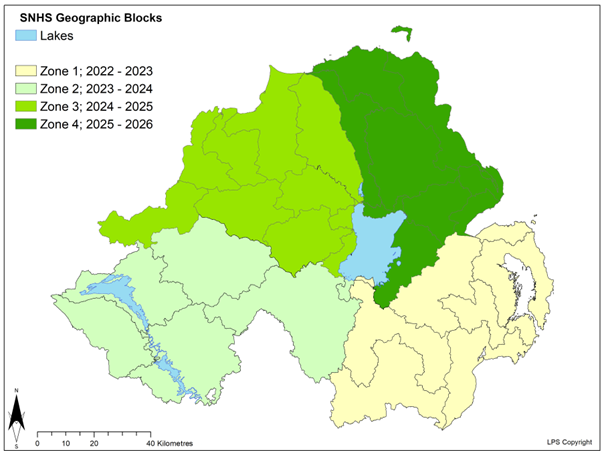The Importance of a Farm Nutrient Management Plan
Date published:
The importance of farm nutrient management planning to Northern Ireland agriculture has been highlighted in two new videos released by AFBI.

The videos released through the Interreg VA Catchment Care project. The release of these videos is timely, as they highlight the significant benefits for farmers of participating in the Soil Nutrient Health Scheme (SNHS).
Through the CatchmentCARE project, AFBI collected detailed information on nutrient inputs, utilisation, outputs and soil nutrient concentrations from farms within the Blackwater catchment. This information was used to develop farm nutrient balances, along with soil nutrient and soil pH maps. Feedback from farmers who participated in the CatchmentCARE project was very positive, with farmers reporting that the colour-coded map format were easy to interpret and beneficial for understanding their fertiliser requirements.
Around two-thirds of farms within the study were advised to apply lime to their fields, resulting in 64% of these farms now at optimum soil pH for grassland management.

Soil Analysis
The key to soil nutrient management is to apply nutrients to enhance the soil’s fertility and support crop growth at locations where it is required, and in the correct amounts. An indication of soil nutrient status can be obtained by collecting soil samples from fields every 4-5 years and analysing for the main plant nutrients phosphorus (P), potassium (K), magnesium (Mg) and sulphur (S), along with soil pH. Regular soil analysis will improve overall nutrient use efficiency, save money on unnecessary fertiliser, reduce the loss of excess nutrients to the environment and eliminate nutrient deficiencies. AFBI research has shown that grass yields can be improved by as much as 2 t dry matter per hectare if nutrients or soil pH are optimal. Balancing production with the environment is key to the sustainability of agriculture in NI. Understanding the nutrient requirements of farms, and how they change over time, can be achieved through regular soil testing and a carefully balanced farm nutrient management plan.
One of the main aims of the CatchmentCare project was to work with local communities to improve freshwater quality in three cross-border catchments. If we over-apply fertiliser and slurry, many of these nutrients can end up being washed into streams, rivers or lakes, which can cause serious pollution to aquatic ecosystems. This can be detrimental to the wellbeing of wildlife that live in or around the water. In addition, nutrients can be lost in gaseous form to the atmosphere before they can be utilised by the crop, particularly as nitrous oxide and ammonia. These emissions are detrimental to the environment both at a local and global scale. In the current economic situation of high fertiliser prices and low profit margins, loss of valuable nutrients from farms, before they are utilised by the crop, along with sub-optimal or surplus inputs, is something we should aim to avoid.

- detailed information on the nutrient status of their soils
- runoff risk maps for nutrient loss to waterbodies for each field sampled
- estimates of carbon stored in their soils and as above ground biomass for each farm
- training on the interpretation of soil nutrient reports and generation of farm nutrient plans (provided by CAFRE).
The scheme will be conducted on a zonal basis, with Zone 1 farms being sampled during winter 2022/23. For farmers in Zone 1 registration is open until 31 August - more information can be found on the AFBI website.
Notes to editors:
AFBI is an arms-length body of DAERA delivering research and development, diagnostic and analytical testing, emergency response capability and expert scientific advice for DAERA and other government departments, public bodies and commercial companies in Northern Ireland, and further afield.AFBI’s Vision is “Advancing the Local and Global Agri-Food Sectors Through Scientific Excellence”.AFBI’s core areas:Leading improvements in the agrifood industry;Protecting animal, plant and human health;Enhancing the natural and marine environment.